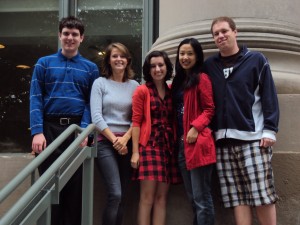Of the several hundred law students who apply to Harvard Law Review each year, only about 40 are chosen. Frank Sabatini ’09 is one of those 40.

Frank Sabatini ’09 (L-R), Alexis Beveridge ’09, Rachel Heron ’09, Xing Yan ’10, and Brandon Gold ’10 at Harvard Law School.
“I was inspired to enter the competition because I enjoy reading legal scholarship,” says Sabatini, who was informed in late July that he had been selected, “and I see the Review as a great way to have an impact on the articles that professors, judges, lawyers, and students may read for years to come.”
A major part of the writing competition requires students to describe and analyze a recent U.S. Supreme Court or Court of Appeals decision. In this case it was Mohawk v. Carpenter. The Review is managed by an 85-member Board of Editors (all students). Eight issues are published annually; each member has the chance to write at least one article by the time they graduate.
Sabatini and four fellow Lafayette graduates are among the 1,800 students who currently attend Harvard Law School. Rachel Heron ’09 and Sabatini are in their second year. The other three–Xing Yan ’10, Brandon Gold ’10, and Alexis Beveridge ’09 started this year.
“Every English or Spanish literature class I took was helpful in learning how to argue for certain interpretations of texts, whether those texts are prior cases or statutes,” says Sabatini. “After all, the heart of the legal argument is not a debate over what the text says but what it means — and I think literature is the same way.”
Rachel Heron ’09 also had a successful, intensive first year. “It was one of the greatest experiences I have had to date,” she says. “Harvard is a perfect fit, and I am more certain than ever that law is my calling.”
Heron got involved with two journals on campus, including Environmental Law Review. Over the summer, she received funding through the Environmental Law Program to pursue an unpaid internship with the Massachusetts Attorney General’s department of environmental protection.
In addition to serving as a teaching assistant for First-Year Legal Writing this year, Heron is also conducting an internship for credit with the Environmental Law Clinic. She is exploring jobs in the public sector for next summer and hopes to find one in the environmental field.
Membership in the Harvard Law Review is limited to second- and third-year law students who are selected on the basis of their performance on an annual writing competition.
